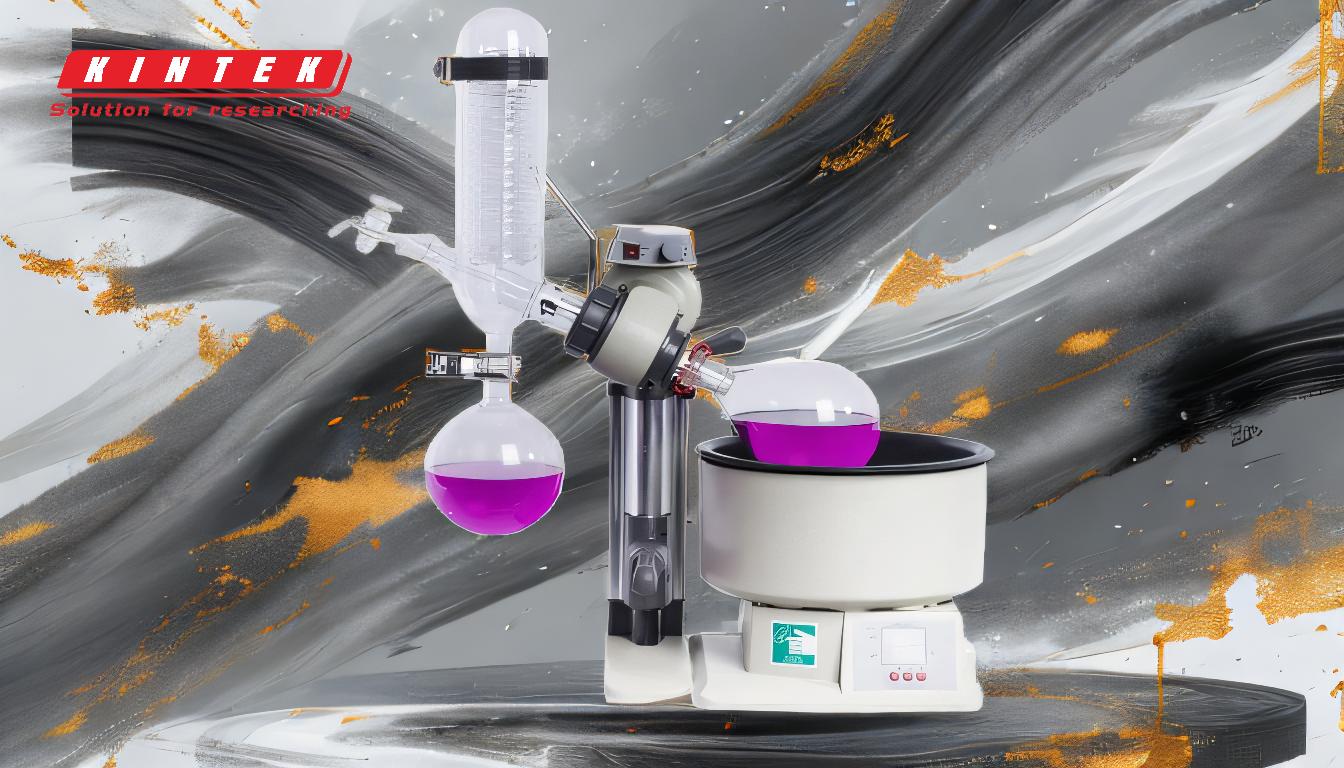The vacuum in a rotary evaporator plays a crucial role in facilitating the evaporation process by reducing the pressure within the system. This reduction in pressure lowers the boiling point of the solvent, allowing it to evaporate at lower temperatures. This not only protects temperature-sensitive compounds from degradation but also ensures a more controlled and efficient separation of solvents from the desired compounds. Additionally, the vacuum system prevents the escape of volatile vapors into the environment, enhancing safety and reducing potential hazards. Overall, the vacuum is essential for faster, safer, and more precise rotary evaporation operations.
Key Points Explained:

-
Lowering the Boiling Point of Solvents
- The vacuum reduces the pressure inside the rotary evaporator, which directly lowers the boiling point of the solvent.
- This allows solvents to evaporate at much lower temperatures than they would under normal atmospheric pressure.
- For example, a solvent that boils at 100°C at atmospheric pressure might boil at 40°C under reduced pressure.
- This is particularly beneficial for heat-sensitive compounds, as it minimizes the risk of thermal degradation.
-
Protecting Temperature-Sensitive Compounds
- By enabling evaporation at lower temperatures, the vacuum helps preserve the integrity of delicate compounds.
- This is critical in applications such as pharmaceuticals, food processing, and chemical synthesis, where maintaining the stability of the sample is paramount.
- For instance, in the extraction of essential oils, excessive heat can alter the flavor and aroma profiles, but a vacuum ensures gentle distillation.
-
Enhancing Solvent-Product Separation
- The vacuum facilitates a more efficient separation of the solvent from the desired product.
- This is achieved by creating a controlled environment where the solvent evaporates and is condensed separately, leaving behind the concentrated product.
- This step is crucial in processes like purification, concentration, and solvent recovery.
-
Preventing Bumping and Ensuring Smooth Operation
- Bumping occurs when a liquid boils too vigorously, causing splashing or uneven evaporation.
- The vacuum system helps regulate the pressure and evaporation rate, reducing the likelihood of bumping.
- This ensures a smoother and more predictable distillation process, which is essential for consistent results.
-
Improving Safety by Containing Volatile Vapors
- The vacuum system creates an airtight environment, preventing volatile vapors from escaping into the air.
- This minimizes the risk of exposure to hazardous chemicals and reduces the potential for fire or explosion.
- It also helps maintain a cleaner and safer working environment for laboratory personnel.
-
Enabling Precise Control Over the Evaporation Process
- The vacuum system allows for fine-tuning of the pressure, which directly influences the evaporation rate.
- This level of control is essential for optimizing the process based on the specific requirements of the sample or solvent.
- For example, adjusting the pressure can help achieve faster evaporation for less sensitive samples or slower, more controlled evaporation for delicate compounds.
-
Reducing Energy Consumption
- By lowering the boiling point of the solvent, the vacuum reduces the need for excessive heat input.
- This not only saves energy but also reduces the operational costs of the rotary evaporator.
- It also contributes to a more sustainable and environmentally friendly process.
-
Facilitating Solvent Recovery
- In many applications, the solvent is a valuable resource that can be reused.
- The vacuum system ensures that the solvent is efficiently evaporated and condensed, making it easier to recover and recycle.
- This is particularly important in industries where solvent costs are high or where environmental regulations mandate solvent recovery.
By understanding these key points, equipment and consumable purchasers can better appreciate the critical role of the vacuum in rotary evaporators and make informed decisions when selecting or maintaining these systems.
Summary Table:
| Key Benefit | Explanation |
|---|---|
| Lower Boiling Points | Reduces pressure, allowing solvents to evaporate at lower temperatures. |
| Protects Temperature-Sensitive Compounds | Prevents thermal degradation of delicate materials. |
| Efficient Solvent Separation | Enhances separation of solvents from products for better purification. |
| Prevents Bumping | Regulates pressure to ensure smooth, consistent evaporation. |
| Improves Safety | Contains volatile vapors, reducing exposure to hazardous chemicals. |
| Precise Control | Allows fine-tuning of pressure for optimized evaporation rates. |
| Reduces Energy Consumption | Lowers heat requirements, saving energy and operational costs. |
| Facilitates Solvent Recovery | Enables efficient recovery and recycling of valuable solvents. |
Discover how a vacuum-powered rotary evaporator can transform your lab's efficiency—contact us today!










